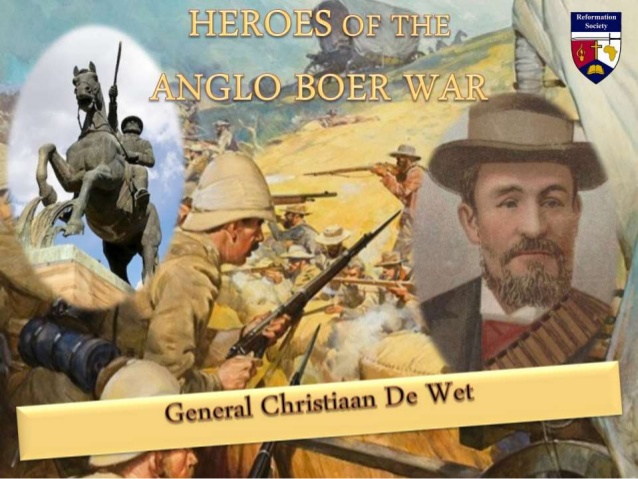by Martin Redfern
Twelve years after the Treaty of Vereeniging ended, the Anglo-Boer War in 1902, a second state of war raised its head in South Africa; this time, a rebellion which could easily have descended into Civil War, but didn’t.
The four youngest and most competent Boer War Generals, now had different mindsets and fortunes.
Louis Botha was now Prime Minister of the Union, while the remarkable Jan Smuts held the Defence portfolio and had warmed to the British. They had both long made their peace with the British victors and were now working for the good of the Country and most of its citizens. Christian de Wet and De la Rey still held commands and fairly responsible positions, but held different opinions of the English; they hated them!
In 1914, Germany declared war on Russia and by reason of numerous treaties and alliances, Great Britain and South Africa were drawn into the struggle against Germany, which included German South West Africa (Namibia). Louis Botha decided that an invasion of S.W.A. would be appropriate, but did not seek the counsel of many important Boer leaders.
Most Imperial troops had embarked for the Western Front, and among the Boers, De Wet and De la Rey decided that now was the time to reverse, and avenge, the result of the second Anglo Boer War (also known in Boer circles as the second Freedom War). Both were stationed in the Northern Cape, close to the S.W.A. border and were on friendly terms with the ‘Hun’ there.
Germans had long sought to foster rebellion among the poor farmers of the Northern Cape, and had offered support to the Nationalist rebels.
The scene quickly switched to a small settlement called Nakob, on the border; situated in desert-like wasteland, it had one vital commodity – water, and plenty of it.
A small invasion of S.A. close to Nakob by the Germans (possibly unintentional) gave Botha and Smuts the excuse they needed to return the compliment by invading S.W.A.
However, the three-pronged invasion plan was bedeviled by the suspect loyalty of Lt. Col. Maritz, Commander of the Union forces in the Gardenia area. And how right they were to suspect his loyalty; he was critical to the success of the invasion, but fed false reports to Louis Botha and Smuts, resulting in nil protection of the remote area, making it ideal for both German invasion and…rebellion.
The three dissident Boer generals has been plotting rebellion from 1912, and a German victory in WWI gave the “irreconcilables” hope of restoring the independence of the two Republics. Hence the situation was ripe for conflict between Botha and Smuts of the South African Party, and Nationalists of De Wet and De la Rey.
Firstly, General Beyers announced rebellion, followed by De Wet, who publicly announced his intentions at Vrede and promptly had 6000 volunteers at his back, many of them battle hardened fighters from the Boer War. From Winburg, De Wet turned south, basing his army in ‘Mushroom Valley’, 30 kms S.E. of Winburg.
While President Steyn was desperately trying to stave off civil war, De Wets’ army’s location was betrayed and he was taken by surprise by Louis Botha loyalists but managed to escape with 2000 men. Botha fought his old comrades reluctantly, but with the greater good in mind.
After ‘Mushroom Valley’, the rebels support gradually faded, but could their rebellion have succeeded? Probably not as Botha and Smuts held the resources of the state, and were both seasoned and successful campaigners, but Germany had promised to recognize an Independent Republic, and Britain’s Imperial troops had left for the Western Front.
Had German military support been greater and more effective, and had Government forces been defeated, or indeed defected, then a Coup could have succeeded. But it was not to be, rebel forces became dejected, with no new volunteers, desertions became a flood.
The German influence on the rebellion was significant, but their material assistance negligible; Botha first crushed the rebels and followed this by thoroughly defeating the Germans in S.W.A.
What became of the rebels? De la Rey was shot and killed accidentally at a Police roadblock, De Wet and Maritz fled to S.W.A., and Botha and, especially Smuts, rose to great things.
Finally, notwithstanding outstanding bravery from both sides, the rebels had overestimated their support, and Government resources were overwhelming.
The rebellion narrowly missed becoming a civil war, precisely because the majority of Afrikaners wanted to bury the past support Botha and Smuts and see the country go forward.
Discover more from Africa Unauthorised
Subscribe to get the latest posts sent to your email.


